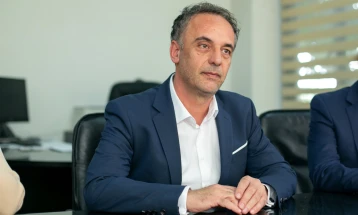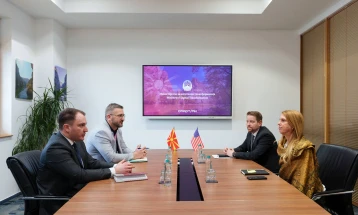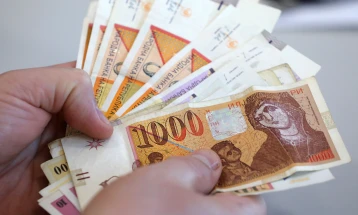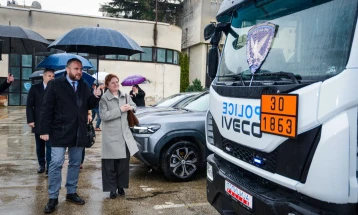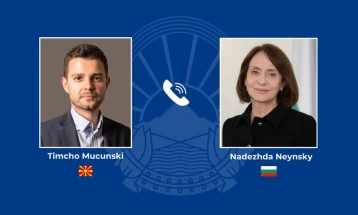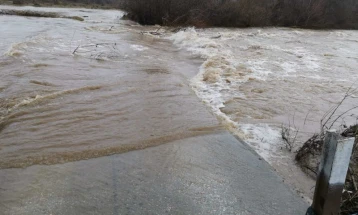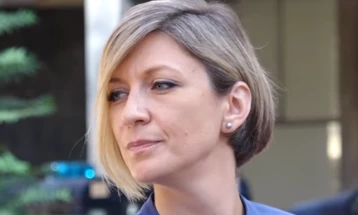Accelerating Western Balkan's NATO and EU integration is the only panacea for region’s problems, Osmani tells MIA
- A coordinated approach between NATO and the European Union and an acceleration of the NATO and EU integrations of the Western Balkan countries is necessary, because it is the only panacea for all problems of the region and it will reduce the influence of third parties, Foreign Minister Bujar Osmani told MIA in an interview in Brussels, where he participated in the NATO Foreign Ministers Meeting on Tuesday.
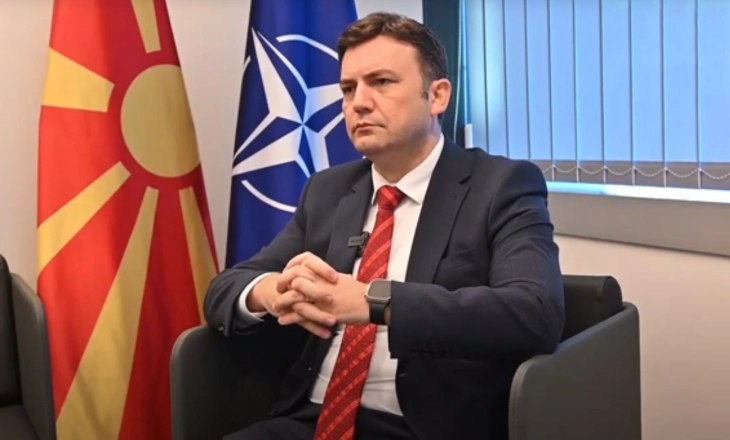
Brussels, 28 November 2023 (MIA) – A coordinated approach between NATO and the European Union and an acceleration of the NATO and EU integrations of the Western Balkan countries is necessary, because it is the only panacea for all problems of the region and it will reduce the influence of third parties, Foreign Minister Bujar Osmani told MIA in an interview in Brussels, where he participated in the NATO Foreign Ministers Meeting on Tuesday.
The Foreign Minister stressed that NATO is paying greater attention to events in the Western Balkans, which, he said, is especially important for North Macedonia, as a part of that region.
Regarding the war in Ukraine, Osmani stressed that North Macedonia has demonstrated it is a trustworthy partner to NATO and the EU, and one of the biggest supporters of Ukraine, both in a political and a military sense.
In the interview Osmani also spoke about the upcoming OSCE Ministerial Council in Skopje, which he assessed as the biggest political and diplomatic that has been held in the country since it became independent, both in terms of scale and importance. The Foreign Minister also touched upon the country’s Euro-integration process, the polarization of Macedonian society, as well as the upcoming elections.
Below is the full interview with Minister of Foreign Affairs, Bujar Osmani:
Hello Minister, thank you for accepting this interview. Today you participated in NATO’s ministerial meeting in Brussels which focused on Ukraine and the events in the Middle East. However, the situation in the Western Balkan is unavoidable as well. Recently we’ve witnessed increased tensions in Kosovo, in Bosnia and Herzegovina, and the Secretary General himself also underscored the heightened tensions. What messages were sent at the meeting regarding the situation in the Balkans?
This is a regular ministerial meeting of NATO which focused on three topics. One of them, which is especially important for us, is the fact that there is a special session on the Western Balkans, which points to the importance of the region for NATO, and of course that also means greater focus on all challenges that could occur. And when you add to this the recent visit of the Secretary General to Skopje, where he met with the leaders of the region, this shows that NATO has increased its attention to the developments in the region, and that’s especially important for us, because, of course, we are a part of this region. The most important thing for us is to ensure there is security and peace in our region. Therefore, the more we manage to maintain NATO’s focus on our region, the greater a success this is for us, as a member state.
Of course, Bosnia and Herzegovina, and the Serbia-Kosovo relations are fragile points. Bosnia and Herzegovina due to the growing separatist narrative, the secessionist narrative of the leaders of Republika Srpska, which we sometimes might underestimate and see as a regular nationalist rhetoric before elections. However, I think this is a dangerous trend, because a part of that rhetoric is being adopted more and more, and it becomes a part of the new normal in our everyday discourse, and then there is no going back. That’s why it’s very important for us all to be vocal and prevent such trends, and of course to encourage the dialogue between Serbia and Kosovo. We were as vocal as NATO in condemning the recent attack in the north of Kosovo by an armed group, as well as the attack on NATO troops, in which 93 NATO soldiers were injured.
North Macedonia has, in a way, its own share in the relationship since it hosted the dialogue between Kosovo and Serbia where the so-called Ohrid Agreement was created, which is the basis for a comprehensive agreement between Serbia and Kosovo centered on mutual recognition, and then the Euro-atlantic integration of all countries in the region.
Of course, today we also spoke about the Washington Summit. You know that next year, during NATO’s 75th anniversary, the Summit will be held in Washington, and this is an exceptionally important summit, because it’s where the basis will be established for NATO in a new, more challenging period that we are entering in the current geopolitical context, and of course the momentum of the aggression of Ukraine, which is especially important. It is also very important for NATO to continue with its unity in support of Ukraine as long as it is necessary.

To what degree can Russian influence, using disinformation and fake news, be identified in the events in the Western Balkans?
I think it is present in various forms, from half-latent invisible influence to more visible influence through proxy actors in the region. However, they are all equally dangerous, including the latent hybrid influence which we seemingly don’t notice, but is constantly working in some way in order to create a fertile soil for the continuation of distrust in the region, of lack of cooperation, of tensions, because only in such conditions can malign factors exert their influence. In stable conditions, when there is cooperation, an accelerated European process, the room for influence is reduced. That’s why my message today was – let’s have a coordinated approach between NATO and the European Union, let’s accelerate the NATO and EU integrations, because this is the only panacea for all problems of the region and it will reduce the influence of third parties.
The situation with Ukraine was also an unavoidable topic at the meeting. How much can North Macedonia contribute when it comes to the support for Ukraine, especially considering it currently holds the OSCE Chairpersonship and in the context of possible peace deals?
North Macedonia has distinguished itself as a true partner and a true ally of NATO despite being at the beginning of its membership, in its first three years. However, we’ve managed to demonstrate that we are a trustworthy partner, because we believe in those values. So, first we aligned our foreign policy with the European Union’s foreign and security policy, with 100 percent alignment with the European Union’s sanctions that were introduced after February 24. However, also retroactively, with all sanctions on Russia introduced since 2014, after the annexation of Crimea. Secondly, we are one of the largest supporters of Ukraine both in a political, and in a military sense. You are aware of the assessments in NATO that show we are ranked fourth in NATO in terms of the military support provided to Ukraine per capita.
Additionally, our OSCE Chairpersonship was under the principle of “no business as usual”, i.e., we cannot talk about the everyday topics of the OSCE, instead we will focus the Organization’s energy on Ukraine, on the responsibility to be borne by the Russian Federation due to the aggression and violation of the basic principles that the Organization is founded on.
So, from all aspects, from both a bilateral and multilateral aspect, we really were unequivocal in our support for Ukraine, because we believe that Ukraine isn’t only fighting for its freedom. Ukraine is fighting for us all, because if the principle of the bigger neighbor attacking the smaller neighbor just because it can, becomes a part of the new normalcy of the global order, then you can imagine what could happen to smaller countries such as ours. We are only protected by an international rules-based order, and that’s why we are fighting so firmly both for Ukraine, and of course, for ourselves.
Since we mentioned OSCE, the Ministerial Council in Skopje is ahead of us, it is quite a big event. What do you expect from this meeting?
Look, the goal of every diplomacy, especially those of the smaller countries is to be able to display the country on the big international scene. I think there hasn’t been a bigger political and diplomatic event held in our country since its independence, than the OSCE Ministerial Council, both in scale and importance.
First, in scale, because 76 states will be present in Skopje, that’s the entire northern hemisphere, and discussions will be held over issues of security in the OSCE region, which will include the ministers of foreign affairs of the most powerful countries in the world. Then, in terms of importance, because our Chairpersonship managed to prevent the fall of the Orgqanization. Due to the low level of trust between participating countries, above all caused by the Russian aggression on Ukraine, the Organization risked disappearing from the international scene. Our Chairpersonship, alongside, of course, all participating countries, managed to get the Organization back on its feet, to ensure that we have a Chairperson for next year, and to continue to serve the people because in the end, it’s about people.
Russian Foreign Minister Lavrov is due to arrive at the Ministerial Council in Skopje. Do you maybe have any information over a possible meeting between Lavrov and Blinken?
First, I think we need to clear up that Mr. Lavrov is not coming to Skopje, he is coming to the OSCE, just as he was in New York a few months ago, at the United Nations, and not in the U.S. Since we are the host, we expect all ministers of the OSCE participating and partner countries. However, of course, we don’t dictate their agendas, the bilateral agendas that they have. We are here to provide the conditions for the ministers of all countries to meet, because we believe that dialogue is the best way to ensure a solution to all problems. That was also at the basis of our efforts, during the Chairpersonship, to urge Russia to halt its aggression, withdraw its troops from Ukraine and return to the principles and commitments of the Organization, and to return to the normal, international rules-based order that has been providing our continent with peace and stability, as well as incredible progress.

Over the past few years, the dominant topic on the internal political scene were the Euro-integrations and the EU accession talks. However, in recent weeks, there is an impression that they have been overshadowed by the talks and discussions over the upcoming presidential and parliamentary elections. Is this a wrong impression?
I think that, like never before, our political environment is polarized in two large fronts. In a European front, led by the parties of the current ruling coalition, and if I can say, some anti-European front, led by certain parties of the opposition. It is in our interest for this topic to remain dominant, to remain the only narrative because it is the only solution for the problems faced by the citizens. You can go out and offer any creative solutions you like, but they aren’t realistic if there is no European support for those solutions. You could promise hills and valleys for the issues of the citizens, but they are only false promises if membership into the European Union isn’t at the basis of your manifesto. And this has proven to be true even for much larger countries – the sole solution for a better living standard for the citizens, a better healthcare, better education, in order to halt the emigration of citizens, to ensure that the youth remains in the country – the sole solution is accelerated membership into the European Union.
And that’s why we believe this topic should remain dominant. Any other narrative, whether it is a populist, nationalist, or a pre-election narrative, is only an attempt to impose partisan interests and career interests at the expense of the essential interests of the citizens. I think it is clear to the citizens that there can be no alternative to the European Union. That’s why, I will repeat, any promise that doesn’t contain the European Union as a basis, is not credible.
Are we close to a date for the holding of elections?
I think it is very important that there is a consensus between the political parties over the date for elections and the form of the elections, and my personal principle is that in order to ensure a level playing field, it is very important that there is agreement from the opposition as well, because we can’t have unequal conditions for competition. Especially in our country, the technical government makes that level playing field possible. There is no country in the world where the opposition appoints an interior minister, the prime minister resigns, the minister of labor and social policy – three deputy ministers with a bound signature… and now when I hear the opposition call for the scrapping of the “Przhino-style government”, as I read somewhere, it represents the biggest compliment for the Government. It means that the opposition trusts that the Government can organize fair elections by itself, and we really should accept that as such. However, I think we need to reach a mutual agreement over the date and form of the elections. And that’s why at the leaders’ meeting, which is expected to be held at the beginning of next month, we will need to hear the opposition parties as well, and make a decision together.
Sashko Panajotov
Photo/Video: MIA
